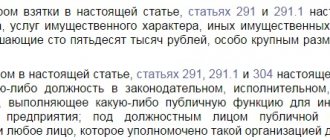Evasion of paying child support is the most common violation of the rights of minors and disabled adults.
In connection with this legislation, means of punishment for such crimes have been developed. Art. 157 of the Criminal Code of the Russian Federation determines the types and measures of punishment for these acts. Multi-channel free hotline Legal advice on criminal law. Every day from 9.00 to 21.00
Moscow and region: +7 (495) 662-44-36
St. Petersburg: +7 (812) 449-43-40
Article 157 of the Criminal Code of the Russian Federation (“Non-payment of funds for the maintenance of children or disabled parents”)
The Criminal Code of the Russian Federation states that parents who regularly do not provide financial support for their children under the age of majority and disabled adults, but are obliged to do this on the basis of a court decision or an agreement certified by a notary between parents, bear criminal liability for this.
Types of liability include the following:
- forced or forced labor;
- arrest;
- deprivation of liberty.
Each type of punishment can be imposed for up to a year, with the exception of arrest. Its maximum duration, in contrast to serving a sentence in prison, is three months.
If adult children who are able-bodied regularly do not provide financial support for their disabled or incapacitated parents, but are required to do so on the basis of a court decision or a notarized agreement between the parties, they are also criminally liable for this.
The limits and types of criminal liability for these acts are the same as in the case of providing for children.
The Criminal Code contains a note to this article, which explains the concepts of “non-payment of alimony by parents” and “non-payment of alimony by children”.
Failure to pay money awarded by a court decision that has entered into force or established by a notarial agreement between parents for the maintenance of minor children (or adults but disabled), if this act is repeated and there are no valid grounds for evading payment of the required amounts, provides for criminal prosecution liability for non-payment of alimony under Article 157 of the Code, if the debtor at the time of consideration of the case before the judge pronounces a sentence is a defendant in an administrative case under the Code of Administrative Offenses of the Russian Federation (Article 5.35.1).
A similar interpretation is provided if the subject (criminal) is an able-bodied child in relation to a disabled parent.
Do I need to notify any authorities about the suspension of activities?
First of all, the employee himself must notify management about the start of downtime. This can be done orally or in writing, for example in a memo. Written notification is required only in 1 case: if the downtime is caused by a strike. Employees who do not participate in it, but also do not have the opportunity to work because of it, must notify the administration in writing. Then they will be paid for this time as downtime for reasons beyond the control of the employee and employer.
The employer may be required to notify the employment service about downtime. But only in 1 case: if it is associated with the suspension of production (clause 2 of Article 25 of the Law of the Russian Federation dated 04/19/1991 No. 1032-I, clause 6 of the letter of Rostrud dated 03/19/2012 No. 395-6-1). The notification form can be used freely or recommended by the employment agency.
IMPORTANT! For failure to report downtime, an administrative fine is possible under Art. 19.7 of the Code of Administrative Offenses of the Russian Federation in the amount of 3,000–5,000 rubles. for organization and 300–500 rub. for its officials.
Commentary to Art. 157 of the Criminal Code of the Russian Federation
Criminal liability for non-payment of alimony under Article 157 of the Criminal Code with the latest amendments is commented on by legal scholars and legal consultants, taking into account the consideration of the elements of a criminal offense.
The objective side of non-payment of alimony under both parts of Article 157 of the Criminal Code of the Russian Federation is the parent’s malicious evasion of the obligation to provide financial support for minors and disabled children.
Evasion of monetary payments to provide children with the necessary financial resources is the failure to make alimony payments by the ex-husband - the father of the child (or the ex-wife - mother), as well as the failure by this person to provide the following information:
- About changing the place of official employment.
- About dismissal.
- Availability of additional sources of income.
- On changes in wages and the like (under Article 111 of the RF IC).
The concept of malicious evasion is spelled out in legislation.
Each judge evaluates it differently. General practice in court cases considers evasion of the obligation to pay financial obligations as the second and subsequent non-payment after the issuance of a warning, the search for a child support father, and repeated evasion of payments by the obligated person. The crime is completed from the beginning of the refusal to pay money for the maintenance of children and spouses (if the children are small - from infancy to three years) or from the establishment of maliciousness in evading payments.
The subjective side is guilt, which is expressed in the form of direct intent.
Article 157 “Non-payment of alimony” defines the subject of the crime as a special one. The subject includes:
- persons who are indicated in the child’s birth documents as parents;
- parents whose paternity of the child is established under Article 49 of the Family Code of the Russian Federation;
- parents in respect of whom a judge has made a decision to deprive them of parental rights.
According to the second part of this article, the objective party will be considered the evasion of the malicious nature of able-bodied and adult children from paying money for the maintenance of disabled parents.
The subjects of the offense are also special subjects - children who are able-bodied and adults. If parents have previously been deprived of parental rights, they are released from the obligation to pay child support.
The list of elements considered is complete and no new elements are added to it.
How is downtime paid?
It all depends on who is to blame:
- If the employer, at least 2/3 of the average salary is paid.
EXAMPLE from ConsultantPlus: An employee was idle for 4 working days - from 03/09/2021 to 03/12/2021. In the billing period from 03/01/2020 to 02/28/2021, he was on vacation from August 3 to 30. The employee worked the rest of the time and received a salary of 410,000 rubles. and vacation pay - 40,000 rubles.... Get trial demo access and find out how to correctly calculate the average earnings to pay for downtime due to the fault of the employer.
Find out how to calculate it from the article “How to calculate the average monthly salary (formula)?” .
- If neither party is at fault, at least 2/3 of the tariff rate or salary, calculated in proportion to the downtime.
An example of calculating downtime for reasons beyond the control of the parties:
The employee was idle for 10 working days. His salary is 40,000 rubles. Payment for downtime - RUB 13,333.34. (RUB 40,000 / 20 days x 2/3 x 10 days).
This is the minimum payment; the organization has the right to increase it.
- Downtime due to the employee's fault is not paid.
Judicial practice under Article 157 of the Criminal Code of the Russian Federation
When asked whether they can be imprisoned for failure to pay alimony, judicial practice in most cases gives a negative answer.
This is due to the fact that this type of liability is brought to bear only after repeated administrative penalties and after two notifications of impending criminal consequences have been served.
In most cases, after the court issues warnings, the obligated person pays money for the maintenance of the children for some time, and after the period for bringing them to justice has passed, they stop paying. And the deadline begins to count down again.
According to the Criminal Code of the Russian Federation, failure to pay alimony can lead to criminal liability in the event of repeated delays in payments for more than four months.
Judicial practice in 2022 shows that severe punishment occurs only after all administrative forms have been exhausted (fine, compulsory and forced labor, arrest for several days).
Case No. 5-278 of 2022 is an example. An administrative case was initiated against citizen E.V. Kolchakov under Article 5.35.1 with the imposition of a certain type of punishment. For two months after the administrative decision was made, he continued to evade financial support for his two minor children. Based on the fact of non-payment, a statement was received from the children’s mother, a new administrative case was opened and sent to court.
The judicial body, having examined the materials collected by the inquiry body, came to the conclusion that the defendant is guilty of committing an offense under the article providing for evasion of financial support for children.
Based on the materials in the case and the repentance of the defendant, the court made the following decision:
- found guilty of committing an administrative offense by omission under Article 5.35.1;
- impose an administrative penalty on the defaulter in the form of compulsory labor activity for sixty hours.
Due to the fact that the punishment was quite mild, the guilty party did not appeal.
How is a downtime issued?
The fact of downtime must be documented. The start of downtime is formalized by order. The order form is free, but must contain the following information:
- start date of downtime and its end (if known);
- reason for downtime;
- information about idle workers (list of employees, departments, etc.);
- the guilty person, again, if it is known who is to blame and whether he is to blame at all.
If it is not possible to immediately determine whether the downtime is the fault of the employee or the employer, you will subsequently need to draw up one more document, for example an act.
In addition to this information, the order recommends specifying where workers should be during downtime: they must still be present at their workplaces or can remain at home. You can also provide payment amounts for downtime.
The time sheet must be prepared in a special way. For downtime, it provides the following ciphers:
- RP or 31 - downtime due to the fault of the employer;
- NP or 32 - for reasons beyond the control of both parties;
- VP or 33 - if the employee is guilty.
Find out more about the report card from the articles:
- “Unified form No. T-12 - form and sample”;
- “Working time sheet - form T-13 (form)”.
Exceptions
Even systematic failure to provide information about the following payments cannot qualify under the article in question:
- Financial assistance and severance pay in case of dismissal.
- One-time premiums for which insurance premiums are not calculated.
- Rewards for outstanding works of art, literature, science.
- Compensation for transfers and business trips to other areas.
- Field allowance, bonuses and other payments that replace room and daily allowances.
- Costs of free utilities and apartments provided.
- Compensation for wear and tear of clothing and tools.
- Amounts for additional food, treatment in sanatoriums (resorts), prosthetics for victims and the cost of caring for them when compensating for damage that occurred due to injury or other damage to health.
- Benefits for the birth of a child.
- Supplement to pensions for disabled people 1 gr. to care for them.
- Funeral benefits from the state, deducted from social security. insurance.
- Compensation for work in extreme or harmful conditions.
- Benefits for single and large mothers.
- Amounts intended for persons exposed to radiation in connection with accidents and disasters at nuclear power plants.
- Benefits for minor dependents during the period of searching for parents, and so on.
How to initiate a criminal case for alimony
Both the collector and the bailiff have the right to personally send an application to initiate a criminal case if the defaulter deliberately does not pay legal alimony, and the situation is repeated many times.
First, the bailiff needs to conduct his own investigation, collect the necessary information about the payer, namely, about the place of work, about property, about the reasons for non-payment of alimony, and the like.
If discovered, the debtor's property will be immediately seized, after which it will be sold in order to reduce alimony arrears. Such measures are fair.
After the property has been sold and the debt has been partially repaid, and the debtor is not active or willing to repay the remaining alimony debt, the bailiff is forced to threaten to initiate criminal proceedings against the latter.
After certain procedural actions are carried out, the bailiff puts forward a resolution that the offender has committed a crime, which is why it is necessary to start the case. The resolution with all available materials is sent to the territorial police department, where the investigator is obliged to conduct an investigation based on the available materials. After this, the case is transferred to court, where it will be considered thoroughly and on its merits.
Appearance in court is mandatory for all parties to the investigation who are able to express their opinions about everything that is happening and present proper evidence in the case.
What does “intentional” evasion of child support mean?
There is such a thing as malicious evasion of alimony payments. We are talking about deliberate, regular evasion of the material support of one’s own child.
There are a number of common reasons for this behavior:
- the defaulter hides true income;
- is wanted;
- resists employment through;
- deliberately hides from the claimant, up to moving to another area, city, country.
What are the tax implications of downtime?
For profit tax, payment for downtime is taken into account as a non-operating expense (subclauses 3, 4, clause 2, article 265 of the Tax Code of the Russian Federation).
Find out how to reflect downtime and part-time work in SZV-STAZH in ConsultantPlus. Get trial demo access to the K+ system and upgrade to the Ready Solution for free.
Personal income tax is withheld from it, and insurance premiums are charged on it, since the list of amounts exempt from tax and contributions does not include payment for downtime.
You can find more complete information on the topic in ConsultantPlus. Free trial access to the system for 2 days.
What evidence of your innocence can you present in court?
The spouse paying money for child support must have proof of such payments. They may be:
- receipt if money is handed over;
- transfer receipts, if sent by mail;
- certificates from the bank when transferring to a personal account;
- a certificate from the accounting department, if they are withheld from earnings upon application.
If there is an agreement that instead of alimony the spouse is left with an apartment or other jointly acquired property, it is necessary to draw up an agreement in which this circumstance is indicated. It must be certified by a notary. If a receipt was not taken, you can provide testimony from two people who will confirm the fact of systematic transfer of money.
If the ex-husband is sure that the child was not born from him, he can petition the court to conduct a genetic examination to annul the fact of paternity. In this case, alimony will not be awarded.
To solve your problem RIGHT NOW get a free LEGAL consultation Moscow
Adult children
Evasion of maintaining disabled dependents who have reached the age of 18 can be expressed both as a refusal to provide the necessary material resources to ensure adequate living conditions for children, and as a failure to show the necessary care for them. For example, this could be a lack of medicine, food, and so on. When establishing the obligation of parents to pay child support, it is necessary to take into account that in Art. 85 of the IC provides an indication of disabled adult dependents who need help.
Objective side
Recorded in the Criminal Code of the Russian Federation, Part 1 of Art. 157 includes criminal violation by parents of two types of duties imposed on them:
- Malicious evasion of maintenance of minor children.
- The same action applies to disabled adult dependents.
To bring to justice as established in the Criminal Code of the Russian Federation, Part 1 of Art. 157 of the guilty party requires the entry into force of a judicial act on the recovery of appropriate funds from the parents. The amount is determined taking into account the amount of salary or other income.
Punishment for non-payment of alimony
If, by a court decision, the defaulter is found guilty of intentionally failing to pay alimony, he may face the following type of punishment:
- imprisonment up to 1 year;
- arrest up to 3 months;
- forced labor;
- correctional work.
The punishment of the accused is decided by the judges, based on the information and materials provided about the defendant.
https://youtube.com/watch?v=neku4U_DTMs%3Ffeature%3Doembed%26wmode%3Dopaque
If the accused does not work anywhere, he will most likely be assigned correctional labor. The task of finding work falls on the shoulders of city executive bodies. The citizen will work at the job presented, and part of the income will be transferred to the state.
The correctional center has the right to assign forced labor to a convicted person. This type of punishment appeared relatively recently, however, it is in demand. Let us remember that forced and corrective labor is a punishment imposed by the court. And if the defaulter does not fulfill his obligation, the punishment will be reviewed, and the judges have the right to replace it with arrest or imprisonment.
The claimant has the right to raise the issue of depriving the payer of parental rights. In this case, the guardianship authorities and, in fact, the very opinion of a minor or incompetent child come into play.
Friends!
Our articles are for informational purposes only and will help you solve your problem!
If you still haven’t found a solution, contact a lawyer for advice using the form on the right, or by calling the phone number listed below!
+7 – Moscow, region
+7 – St. Petersburg, LO
+8 ext. 430 – all regions of the Russian Federation
Calls and requests are accepted around the clock, every day. It's fast and free!
I would also like to note that there is such a thing as relapse. That is, if a citizen is repeatedly accused of failure to pay alimony, and the criminal record has not been expunged, he will face imprisonment for a period determined in court.
How to collect arrears of alimony for all time
According to the law, in the event of a divorce, the spouse who will live separately must provide financial support to his child. Not only the mother or father can file a claim demanding payment of alimony, but also:
- Guardian, trustee or adoptive parent.
- Administration of the institution in which the child is being raised.
- Adoptive parents.
- Guardianship and trusteeship authorities.
The procedure for the trial will vary depending on:
- Has the applicant previously filed a claim in court?
- Is there a writ of execution or a notarized agreement?
If there is a notarized agreement or a writ of execution issued as a result of a court decision, money can be recovered from a person evading alimony payments for the entire period during which he evaded them.








